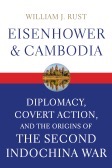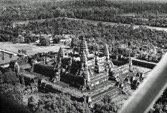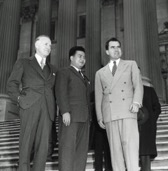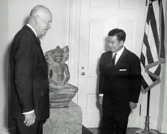Bill Rust has made it his purpose to dig deep for explanations of the origins of the American war in Southeast Asia. In Eisenhower and Cambodia Rust shines a penetrating light on the murkiest corner of all, the impact of American actions on the neutralist nation of Cambodia and its Prince Norodom Sihanouk. Rust's account considerably advances our knowledge of Eisenhower's and Kennedy's actions in Cambodia. No student of the Vietnam war can afford to miss Eisenhower and Cambodia.
John Prados, author of Vietnam: The History of an Unwinnable War, 1945–1975
William Rust, author of two recent definitive books about American relations with Laos, now explores US relations with Cambodia during the Dwight Eisenhower administration. This is a careful, impressive, well written and researched diplomatic history that highlights the administration’s antipathy toward neutralism in the Cold War, which led it into ill-advised and self-defeating efforts to destabilize Prince Norodom Sihanouk’s government. It will stand as the authoritative work for many years to come.
Kenton Clymer, author of A Delicate Relationship: The United States and Burma/Myanmar since 1945
William Rust’s engaging book contributes significantly to our understanding of U.S.-Cambodian relations, the origins of the Vietnam War, and the role of covert operations in American foreign policy during the Cold War. As he does in his other books, Rust relies on extensive archival research to craft a gripping and accessible narrative that brings to life the characters on all sides of this complex story.
Jessica Elkind, author of Aid Under Fire: Nation Building and the Vietnam War
Rust’s brilliant account of the Eisenhower and Kennedy administration's attempt to leverage a recalcitrant Cambodian leader into a Cold War alliance reveals much about American diplomacy then and now. Extensively researched and exceptionally readable, this groundbreaking book discloses the often shadowy realities of what occurs when government officials from dissimilar cultures endeavor to bend each other to their will.
Walter E. Kretchik, author of U.S. Army Doctrine: From the American Revolution to the War on Terror
Elizabeth Becker, LSE Review of Books, January 16, 2017
“…valuable, well-researched, and lucidly written…Rust focuses on both covert and overt channels, demonstrating that the former permeated into the latter…[the book] undoubtedly enriches our knowledge by offering clear and concise analysis of primary material that will interest not only students of Indochina but also those who seek to develop a wider understanding of center-periphery relations during the Cold War.”
Radoslav Yordanov, Journal of Cold War Studies, Winter 2023




















